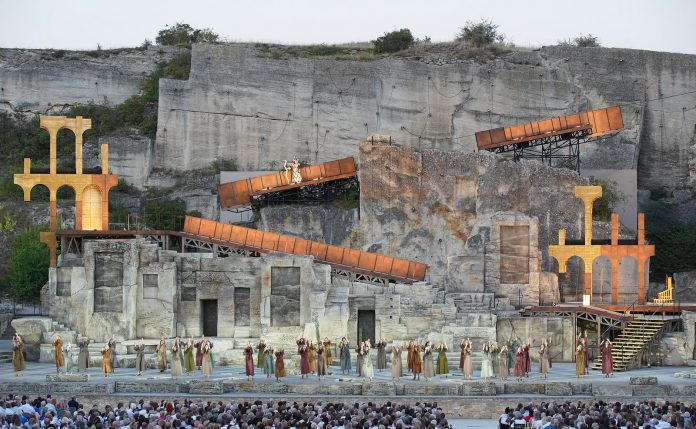“Oper Im Steinbruch”, the annual opera event set in the Roman Quarry amphitheatre of St Margarethen, has become a summer staple, with production values as big as the stage itself: At 80-metres wide and 30-metres deep, it is Europe’s largest outdoor stage.
Event sound designer Volker Werner relies upon the object-based spatialisation of TiMax SoundHub to ensure the classical opera narratives, such as this year’s Nabucco by Verdi, are simple to follow for the 4700-capacity audiences.
As remarkable as the size and scale of stage and event, is that each year since inception in 2017 the speaker positions are integrated into the main stage scenery.
A total of 98 loudspeakers occupy 53 speaker positions on the main stage and these are spatially unified by a redundant system of two 64-channel TiMax SoundHub processors with Dante which handle the spatialisation and vocal localisaton for the main stage.
Integrated into the system with TiMax is an Amadeus Active Audio system providing spatial acoustics on an extended 32-channel surround system. Werner relies on TiMax year on year as the only way, “…to easily create a flexible, high-channel count, directional acoustic reinforcement system using dynamically managed precedence.”
Out Board director Robin Whittaker was on hand during set up to assist with the TiMax TrackerD4 deployment and TiMax SoundHub setup and integration with Amadeus. TiMax TrackerD4 precision stagetracking is also in place with fourteen TTd4 Sensors to cover the vast and open-air stage.
Natural and Realistic
TrackerD4 automates the vocal localisation of the solo performers, allowing their movements across the pre-zoned stage to sound as natural and realistic as possible.
As each role is also played by several performers, employing TiMax TrackerD4 frees each performer from the rigidity of precise positioning into pre-rehearsed locations. The 80-voice choir was simultaneously manually automated by the TiMax SoundHub integral showcontrol on a scene-by-scene basis.
Whilst the real choir was singing off-stage and out of sight, they were automatically overlaid onto the matching positions of the extras on stage, whilst some elements of the choir vocals were spatialised to seem as if they were behind the scenery.
As well as an orchestra, Nabucco called for a stage band, which was handled with pre-recorded content played back from QLab that triggered TiMax spatialisation via OSC, which relocated the audio to different positions on stage and also backstage.
The full effect, which incorporated EQ Snapshot automation in TiMax alongside the spatial automation, had the band ‘walking’ from centre backstage to frontstage left, and on to frontstage right.
The effect according to Volker, “recreated the colour change of a distant sound changing to a close sound.” The effect was one of the many soundscapes created by TiMax that augmented the Amadeus Active Acoustics system utilising the 32-channel surround sound system.
These channels created active acoustics both at the stage and around the audience and also doubled as an immersive audio fx system that extended the work of TiMax for static effects and also for animated effects such as lightning strikes and thunder. TiMax TrackerD4’s Tracker Translate app also fed live OSC data to the active acoustics system that matched the singers’ stage positions.
This meant the early and late reflections in the Amadeus system were generated and interpolated in real time to the positions of the singers.
Volker goes on to explain, “Since all the reflections from the quarry have the right timing, we created a great blend from the direct sound and the natural reflections, just as though it were like real concert acoustics.”





